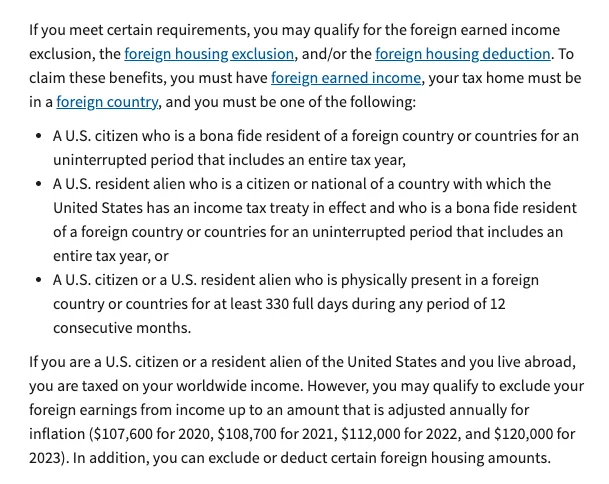3 years ago, I left the Land of the Free. And I never had a clue that I’d lead a happier, healthier, wealthier, and more free life in Latin America.
Who would have known that?!
Essentially, what I’ve learned is that before you go, you never know what a new location has in store for you. Hell – It could be the ideal place for you to live the rest of your life.
That’s why I think digital nomadism is the best way to experiment and find where you were meant to live – at least for the foreseeable future.
But you can “do” nomadism several different ways. And what’s the right choice for you might be the least optimal for someone else. So I’ve gathered my thoughts around 3 tax-optimal strategies of nomadism (two of which I’ve personally lived myself!):
Fast-travel freeflow method (2-1-2-1-2-1-2-1)
Great strategy for: Beginner nomads in experimentation mode
If you’re just getting started on your nomadism journey, I’d recommend seeing as much as possible in as little time as possible – within reason. Why? To explore and find which locations fit your personality and goals best.
Introducing the fast-travel freeflow method of nomadism.
The freeflow method involves moving between locations in short intervals – typically 1-2 months in each place. This is extremely fast travel. If you’ve never traveled this way before, let me be the first to tell you that it’s unsustainable for long periods of time.
However, there’s no better way to test as many different environments, cultures, and communities as this strategy.
👍 Pros
Great for experimenting —
Like I’ve said before, nomadism should be purposeful. You should enter this phase of life with a goal to test life in several environments and choose one or several for long-term bases.
So, the freeflow method is ideal for beginner nomads who want to test different languages, regions, climates, cultures, and lifestyles.
Can be tax-optimal —
If you’re from a high-tax country, this is not a good strategy because you don’t stay in one low-tax country long enough to create economic ties and claim tax residency. Therefore, you’re stuck paying the high taxes in your home country you’re trying to escape. Bummer.
But if you currently pay taxes in a low-tax jurisdiction, this is a great way to see more of the world without triggering tax residency in any other country.
For more on this topic, check out my essay on the 3-step process to eliminate taxes from your life.
Flexibility —
With this kind of fast-travel, you don’t have anything tying you down. Of course, that lack of responsibility gives you lots of flexibility. Go with the flow.
By the way, I’ve lived in 10 countries in the last 3 years and use a list of 17 criteria to pick my next homebase. You get it for free when you subscribe to the Freedom Files newsletter.
👎 Cons
Not recommended for entrepreneurs —
If you’re serious about your career or online business, I wouldn’t recommend this fast-travel approach.
Why?
While building my marketing agency a few years ago, I lived in several countries and bounced to a new one every 2ish months.
As you can imagine, I have several reasons for quitting that lifestyle: The lack of stability and routine can really hinder your growth.
Severe loneliness —
No matter if you’re building a business or not, you will be affected by lack of strong relationships. The greatest benefit of living in one solid place is the strong friendships and business network.
So the opposite is true.
If you have no consistent homebase, you will suffer from loneliness and lack of real relationships.
Take it from me – When you move to a new city or country every few weeks or months, you can only create shallow, superficial relationships with other transient folks. You can pretty much rule out any local relationships.
For obvious reasons, this is not ideal in the long-run.
No equity —
Constantly changing locations means you don’t establish a long-term presence, relationships, or investments in any particular place.
Again, in the long-run, this is no bueno.
I’d recommend either returning often to the same homebase(s) each year or spending significant time there if you want to build community, relationships, and some sense of “home.”
Slow-travel homebase method (4-4-4)
Great strategy for: Entrepreneurs/remote workers seeking stability & flexibility
That brings us to what I like to call the slow-travel homebase method, popularized by Andrew Henderson (he calls it the trifecta method). This nomadism strategy involves spending ~4 months in each of ~3 strategic bases throughout the year.
👍 Pros
Stability —
Provides you the chance to structure your life in several locations that make you feel the happiest, the healthiest, the free-est, etc. Deeper ties in each community mean a welcome return each time you’re back in one of your homebases.
And since you spend 4 months in each, you get to settle in, get comfortable, and create more relationships in the community than if you were there for just a few weeks.
Strategic bases —
This is the opposite of fast-travel. Instead of living out of a backpack and moving your whole life every few weeks, you pick ~3 places to optimize your life on tax, quality of life, and climate to return to each year. You may even own homes in each location.
This is my future.
After nomading for a few years, I purchased real estate here in Latin America. And in the future, we’ll spend significant time each year in Southern Europe and possibly the United States.
Why? To optimize our tax situation, dabble in a few different lifestyles we love, and still get that sense of wanderlust and travel we want in our lives.
Flexibility —
Having several homebases around the world offers its fair share of benefits.
First, you can bounce between them just like you would a lake house and city life in your home country. Different vibes for different seasons.
Second, with time spent in each jurisdiction, you can …
- work your way toward residency and/or citizenship,
- invest time, energy and capital in the local business network and find opportunities,
- and have a plug-and-play style relationship with each city.
As I get older, this (diversifying my nationality stack and becoming ungovernable) is more important to me.
👎 Cons
Planning required —
Of course, if you’ll have multiple homebases around the world, this slow-travel homebase method requires careful selection and management.
Don’t create too strong of economic ties and trigger tax residency where you don’t desire to or intend to pay taxes. (Look up local rules and regulations to make sure of this.)
Low-tax method (6-1-1-1-1-1-1)
Great strategy for: Americans & entrepreneurs/remote workers seeking travel
This method involves splitting your time between a low-tax jurisdiction (like Paraguay 🇵🇾 or Dubai 🇦🇪) in order to trigger tax residency and traveling freely.
Each country has different rules and regulations for tax residency. In the aforementioned countries Paraguay and United Arab Emirates, both require just 120 and 90 days, respectively, to claim 0% tax residency. Nice 👍
But other countries may require you to spend half the year there and create strong economic ties like owning a home and paying utilities and club membership fees.
So this low-tax method requires you, first, to read up on your ideal low-tax jurisdiction, and second, to spend the requisite time or create the necessary ties there. Then it’s up to you how you spend the rest of the year.
If you’re looking for just a single low-tax homebase and still have a lust to travel, this is a great method for you.
👍 Pros
Low-tax homebase —
Most no-/low-tax countries require you to live in their jurisdiction 6 months in a contiguous 12-month period to claim tax residency there. But once you have tax residency in that country, you can exit from your current high-tax jurisdiction and significantly reduce your tax bill each year.
It really is that easy. Goodbye, high tax bill 👋
FEIE credit for Americans 🇺🇸 —
Let me empathize with US citizens for a second here. We were dealt a crappy hand with worldwide citizenship-based taxation.
However, there are legal ways to reduce your American taxes. And one of the most effective ways is to spend significant time outside the country.
Ever heard of the Foreign Earned Income Exclusion (FEIE) credit? This IRS benefit allows US citizens to exempt their first $126,000 of personal income (in 2024) from taxes IF they satisfy one of the following two rules:
- You spend more than 330 days outside the United States in any 12-month period.
- You establish tax residency in a foreign country.

So if you spend a decent chunk of the year in the United States, triggering tax residency in a foreign country is your best option to offset some taxable income and reduce your bill to Uncle Sam every year.
Travel flexibility —
After you trigger tax residency in your desired low-tax country, the world is your oyster and you can spend it however you’d like. That’s why I like to claim this low-tax method is great for travel.
Half of the year in monk mode in your chosen tax haven. Half of the year goofing off elsewhere.
👎 Cons
Commitment to homebase —
For many people, establishing a homebase is a dealbreaker. They’re not ready to hunker down anywhere for 6 months in a yearlong period.
But also, remember, you don’t have to remain in that country for 6 consecutive months. You just have to satisfy the cumulative physical presence requirements of tax residency in a contiguous 12-month period.
But if you prefer constant movement and the more nomadic lifestyle, this ain’t for you. I’d recommend the fast-travel freeflow method.
Less fun —
Simple supply and demand.
Most “fun” first-world countries are tax hells. (Looking at you, Spain 🇪🇸.) They command a lot of attention and immigration. Therefore, they can charge high taxes to those who want to come enjoy their high quality of life.
Tax havens, on the other hand, are typically the opposite. Ever heard of landlocked Paraguay or Bolivia 🇧🇴?
One way they incentivize immigration to and investment in their country is favorable tax regimes. If they charged the same high tax rates as Canada 🇨🇦 or Germany 🇩🇪, they wouldn’t receive the attention they get.
But if you can find a fun, high quality-of-life tax haven where you’re happy, healthy and free, by all means! It’s all about balance.
So which method floats your boat in this season of your life?
If you’re seeking a life abroad with less tax, check out the rest of the resources here in the Freedom Files.


